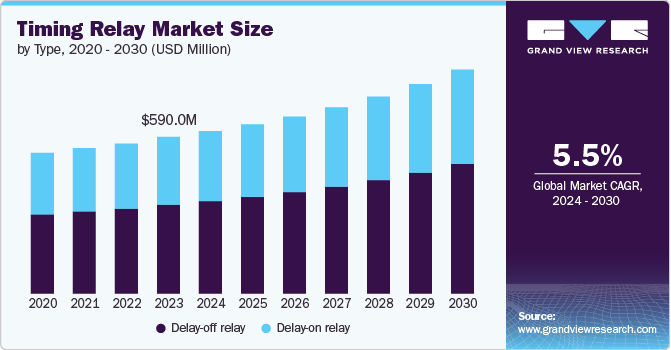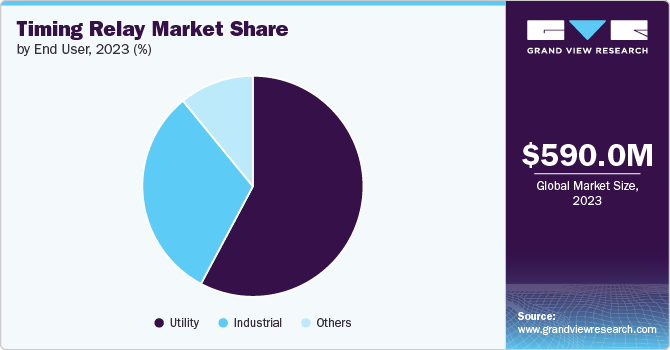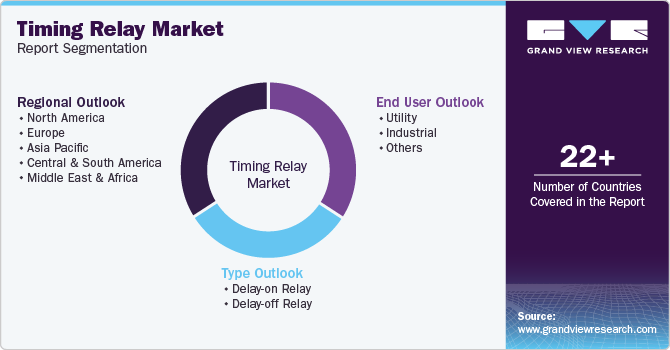
Timing Relay Market Size, Share & Trends Analysis Report By Type (Delay-on Relay, Delay-off Relay), By End User (Utility, Industrial), By Region, And Segment Forecasts, 2024 - 2030
- Report ID: GVR-4-68040-420-9
- Number of Report Pages: 150
- Format: PDF
- Historical Range: 2018 - 2023
- Forecast Period: 2024 - 2030
- Industry: Energy & Power
Timing Relay Market Size & Trends
The global timing relay market size was estimated at USD 590.02 million in 2023 and is expected to grow at a CAGR of 5.5% from 2024 to 2030. Increasing automation across various industries, including manufacturing, automotive, and process industries, is driving the growth of the timing relay market. As companies seek to improve efficiency and reduce human error, timing relays play a crucial role in controlling sequences of operations, managing start-up and shut-down procedures, and ensuring precise timing in automated systems. For example, in assembly lines, timing relays are used to coordinate the movement of conveyor belts, robotic arms, and other equipment to optimize production flow.

In addition, the growing emphasis on energy efficiency and power management is positively influencing the timing relay market. Timing relays are essential components in energy management systems, helping to control lighting, HVAC systems, and other power-consuming equipment in commercial and residential buildings. They enable scheduled operation of devices, ensuring they are only active when needed, thus reducing energy consumption and costs. For instance, in smart buildings, timing relays can be programmed to turn off non-essential equipment during peak energy demand periods or to manage the operation of renewable energy systems.
Moreover, the expansion of smart grid technologies and the increasing adoption of renewable energy sources are also driving demand for timing relays. These devices are critical in managing power distribution, load balancing, and fault protection in electrical grids. As power systems become more complex with the integration of various energy sources, timing relays help ensure smooth transitions and protect equipment from damage due to power fluctuations. In solar and wind power installations, for example, timing relays are used to synchronize power output with grid requirements and manage battery storage systems.
Type Insights
Delay-off relay segment registered the largest revenue market share of over 56.0% in 2023. The market for delay-off relays is largely driven by safety considerations and process optimization needs across various industries. These relays are crucial in applications where a gradual shutdown or cool-down period is necessary to prevent damage to equipment or ensure personnel safety. For instance, in HVAC systems, chemical processing plants, and data centers, delay-off relays help manage residual heat or maintain critical processes for a set duration after the main power is cut.
On the other hand, the demand for delay-on relay is primarily driven by the need for controlled and sequenced start-up processes in various industrial and commercial applications. They are essential in scenarios where sudden power surges need to be avoided, such as in large motor start-ups or complex machinery initialization. The growing automation in manufacturing and process industries has increased the demand for these relays, as they allow for precise timing control and smooth operation of interconnected systems.
End User Insights
Utility end user segment accounted for the highest revenue market share of over 57.0% in 2023. Timing relays in the utility sector are used in power generation, transmission, and distribution systems. The growing demand for reliable power supply, increasing investments in smart grid technologies, and the need for efficient energy management are key drivers for timing relay adoption in the utility sector.

In the industrial sector, timing relays are widely used in manufacturing processes, automation systems, and machinery control. They help in sequencing operations, controlling motor starts and stops, and managing production cycles. Industries such as automotive, food processing, pharmaceuticals, and chemicals rely heavily on timing relays for precise control and safety measures. The demand for more precise control, reduced downtime, and enhanced safety measures also contribute to the growth of timing relay usage in industrial applications.
Regional Insights
North America dominated the market and accounted for the largest revenue share of over 32.0% in 2023. The region's advanced manufacturing sector, particularly in industries such as automotive and aerospace, is increasingly adopting automation and smart factory technologies. Besides, the region's focus on energy efficiency and smart grid technologies is another significant factor driving the market.
U.S. Timing Relay Market Trends
The U.S. government's focus on infrastructure development and smart city initiatives is propelling the growth of the timing relay market. Smart grid systems, traffic management, and building automation all require precise timing control, creating opportunities for timing relay manufacturers. For instance, cities such as New York and Los Angeles are implementing intelligent traffic light systems that use timing relays to optimize traffic flow and reduce congestion.
Europe Timing Relay Market Trends
Europe's smart city initiatives are creating new opportunities for timing relay manufacturers in the region. From traffic management systems in Amsterdam to energy-efficient building controls in Stockholm, timing relays are being integrated into various urban infrastructure projects. These devices enable precise scheduling of lighting, heating, and ventilation systems, contributing to energy savings and improved urban living conditions. As more European cities adopt smart technologies, the demand for advanced timing relays is expected to grow substantially during the forecast period.
Asia Pacific Timing Relay Market Trends
The automotive and electronics industries, which are significant consumers of timing relays, have a strong and growing presence in Asia Pacific. Countries such as Japan, South Korea, and Taiwan are global leaders in electronics manufacturing, while China and India are emerging as major automotive production hubs. The increasing adoption of electric vehicles and advanced driver-assistance systems (ADAS) in these markets is driving demand for sophisticated timing relays used in battery management, motor control, and safety systems.
Key Timing Relay Company Insights
The timing relay market is highly competitive with several large players competing for market share globally. Some of the major companies in this market include Schneider Electric, Eaton Corporation, Siemens AG, Omron Corporation, and ABB Group. The market is expected to grow steadily, driven by rising investments in electrical networks, growth in renewable energy, and industrial automation. However, the market is quite fragmented with the presence of several regional and local players. The market is witnessing some M&A activity as larger players acquire regional companies to expand their geographic presence and product portfolio, thus shaping the competitive dynamics of the market.
Key Timing Relay Companies:
The following are the leading companies in the timing relay market. These companies collectively hold the largest market share and dictate industry trends.
- Omron Corporation
- Schneider Electric
- Eaton Corporation
- ABB Group
- Siemens AG
- TE Connectivity
- IDEC Corporation
- Phoenix Contact
- Crouzet
- Finder S.p.A.
- Comat Releco
- Geya Electrical Equipment
- Audiotronics
- Paragon Auto Control
- JVS Electronics Pvt. Ltd.
Recent Developments
-
In January 2024, Teledyne Relays, a manufacturer of high-performance relays and switches, announced the launch of its innovative Multi-Function Timer Series. This new product line offers advanced timing capabilities for a wide range of applications, including industrial automation, building automation, and transportation systems. The Multi-Function Timer Series features programmable timing functions, multiple output options, and a compact design, making it a versatile solution for various timing control requirements.
-
In May 2021, Standex Electronics announced the acquisition of American Relays, Inc., a move aimed at enhancing its capabilities in the relay and switch market. This acquisition will expand Standex's product offerings and strengthen its position in the industry, allowing for increased innovation and customer service. American Relays, known for its high-quality relay products, will contribute to Standex's strategic growth and operational synergies. The integration is expected to benefit both companies by leveraging their respective strengths in engineering and manufacturing.
Timing Relay Market Report Scope
|
Report Attribute |
Details |
|
Market size value in 2024 |
USD 611.70 million |
|
Revenue forecast in 2030 |
USD 843.44 million |
|
Growth rate |
CAGR of 5.5% from 2024 to 2030 |
|
Historical data |
2018 - 2023 |
|
Forecast period |
2024 - 2030 |
|
Quantitative units |
Revenue in USD million, and CAGR from 2024 to 2030 |
|
Report coverage |
Revenue forecast, competitive landscape, growth factors and trends |
|
Segments covered |
Type, end user, region |
|
Regional scope |
North America; Europe; Asia Pacific; Central & South America, Middle East & Africa |
|
Country Scope |
U.S.; Canada; Mexico; Germany; UK; France; Italy; Spain; China; India; Japan; South Korea; Australia; Brazil; Saudi Arabia |
|
Key companies profiled |
Omron Corporation; Schneider Electric; Eaton Corporation; ABB Group; Siemens AG; TE Connectivity; IDEC Corporation; Phoenix Contact; Crouzet; Finder S.p.A.; Comat Releco; Geya Electrical Equipment; Audiotronics; Paragon Auto Control; JVS Electronics Pvt. Ltd. |
|
Customization scope |
Free report customization (equivalent up to 8 analyst’s working days) with purchase. Addition or alteration to country, regional & segment scope |
|
Pricing and purchase options |
Avail customized purchase options to meet your exact research needs. Explore purchase options |
Global Timing Relay Market Report Segmentation
This report forecasts revenue growth at global, regional, and country levels and provides an analysis of the latest industry trends in each of the sub-segments from 2018 to 2030. For this study, Grand View Research has segmented the global timing relay market report based on type, end-user, and region:

-
Type Outlook (Revenue, USD Million, 2018 - 2030)
-
Delay-on Relay
-
Delay-off Relay
-
-
End User Outlook (Revenue, USD Million, 2018 - 2030)
-
Utility
-
Industrial
-
Others
-
-
Regional Outlook (Revenue, USD Million, 2018 - 2030)
-
North America
-
U.S.
-
Canada
-
Mexico
-
-
Europe
-
Germany
-
UK
-
France
-
Italy
-
Spain
-
-
Asia Pacific
-
China
-
India
-
Japan
-
South Korea
-
Australia
-
-
Central & South America
-
Brazil
-
-
Middle East & Africa
-
Saudi Arabia
-
-
Frequently Asked Questions About This Report
b. The global timing relay market was estimated at around USD 590.02 million in the year 2023 and is expected to reach around USD 611.70 million in 2024.
b. The global timing relay market is expected to grow at a compound annual growth rate of 5.5% from 2024 to 2030 to reach around USD 843.44 million by 2030.
b. Utility emerged as a dominating end-user with a value share of around 57.0% in the year 2023.The rising demand for a dependable power supply, increased investments in smart grid technologies, and the necessity for efficient energy management are key factors driving the adoption of timing relays in the utility sector.
b. The key player in the timing relay market includes Omron Corporation, Schneider Electric, Eaton Corporation, ABB Group, Siemens AG, TE Connectivity, IDEC Corporation, Phoenix Contact, Crouzet, Finder S.p.A., Comat Releco, Geya Electrical Equipment, Audiotronics, Paragon Auto Control, and JVS Electronics Pvt. Ltd.
b. The timing relay market is driven by the growing demand for automation in industries, the need for efficient energy management in power systems, and advancements in smart grid technologies. Additionally, increasing investments in infrastructure and industrial automation are further boosting the growth of timing relay market.
We are committed towards customer satisfaction, and quality service.
"The quality of research they have done for us has been excellent."




